Edie Melson's Blog, page 217
December 10, 2019
Make Your Writing Research Take You Further With These 7 Tips

by Linda Gilden @LindaGilden
Has it ever occurred to you to use your article research to write different types of articles once your original article is published? For most researched articles, there is always a file of information you have to cut in order to stay within your word count. Save it and turn it into assorted types of articles.
There are several basic article types popular with magazines and that lend themselves well to repurposing the material. Here is a quick look at the types of articles you can use.
1. Personal Experience article—This is your story. Not all of it in one place (that would be a book!) but a snippet of one experience that you can share with readers that will make an impact on their lives.
2. Profile article—Similar to the personal experience but it isn’t your experience. You are writing about the experience of someone else. For this you must interview your subject and learn all you can about him or her.
3. Round Up article—This one is really just what it sounds like. You “round up” information on one subject from several sources and cohesively present it to your readers.
4. Calendar article—This article would be related to a season or calendar event.
5. How To article—Article that teaches the reader something new.
6. Issue article—Often “piggybacks” on something in the news. Article must be balanced.
7. Devotional/Inspirational—Makes a single God-centered point that directs readers to God and/or inspires the reader to become a better person.
For example, if you have done a profile article from a celebrity interview, why not ask a few extra questions during your time together that will help create another article. If you have spent most of your time talking about his or her career, ask about a special Christmas memory. Record the details to save for a seasonal article that centers on special holiday memories of celebrities. If your celebrity has a particular hobby or skill, use what you learn as a springboard for a how-to article. Or if he or she is a political figure and has been in the news discussing a specific issue, do a little more research for a balanced issue article. This one interview could be the springboard for multiple articles.
Each article type has specific guidelines but all are easy to master. If you've never done so, try to stretch your research today by writing more than one article from your information. If you have, share with us in the comments below how you stretch your research.
TWEETABLE
Make Your Writing Research Take You Further With These 7 Tips - @LindaGilden on @EdieMelson (Click to Tweet)
 Linda Gilden is an award-winning writer, speaker, editor, certified writing and speaking coach, and personality consultant. Linda is the author of 19 books and over 1000 magazine articles. She enjoys every meeting with editors and knowing we are all part of the same team. Linda’s favorite activity (other than eating folded potato chips) is floating in a pool with a good book surrounded by splashing grandchildren—a great source of writing material! www.lindagilden.com
Linda Gilden is an award-winning writer, speaker, editor, certified writing and speaking coach, and personality consultant. Linda is the author of 19 books and over 1000 magazine articles. She enjoys every meeting with editors and knowing we are all part of the same team. Linda’s favorite activity (other than eating folded potato chips) is floating in a pool with a good book surrounded by splashing grandchildren—a great source of writing material! www.lindagilden.com
Published on December 10, 2019 22:00
December 9, 2019
Being the Storyteller We Love
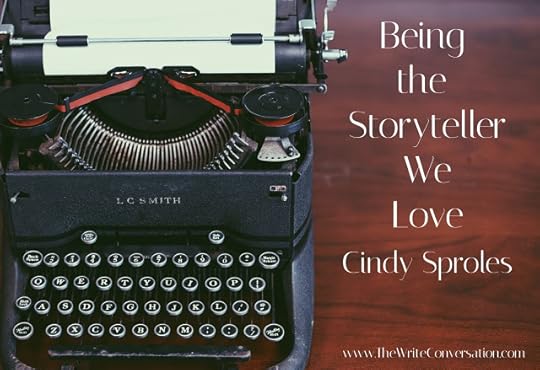
by Cindy Sproles @CindyDevoted
Grandma was a wonderful storyteller. Twenty-seven years after her death, I doubt even one cousin would fail to recognize her tales after just one or two phrases. We loved sitting around her in the living room listening to her yarns and trying to decipher truth from fiction.My grandmother wasn’t a writer. She could spell and write just enough to scribble a recipe or do her bank business, but she WAS a storyteller and she was a story maker. I suppose my love of writing stemmed from her. The desire to spin a tale that was memorable, be it humorous or touching, was something I wanted.
Becoming a good storyteller begins with life experiences. It’s learning to take your own experiences, and those of others, then adding a friendly twist. I remember my uncles trying to “out tell” one another. They would make up characters, add them to a story and ramp up the fun. The truth is, those stories still live on in our family. Every cousin continues to embellish them more.
We’re writers. We spin tales. Aren’t we already storytellers? Yes and No. It’s easy to put a story on the page and leave out those tidbits that take your story from flat to fabulous. Storytelling is not just in the story. It’s in the carefully crafted moments that ding the emotion of your reader. Sometimes it’s the comic relief needed to give the reader a breath in an intense moment. Other times, it’s in the banter of your characters. It’s important to remember to include the finer details and never assume our reader just “gets it” or automatically fills in the blanks. Tweaking your storytelling skills takes practice. It takes time to lose the attitude that there is only one way to tell your story, then loosen up enough to try something unexpected.
Follow these steps to help you become a better storyteller.
Add humor to banter: Take time to listen to conversations around you. Even serious conversations carry a bit of humor. This doesn’t mean you lessen the topic, it simply means that even in hard talks we need a breath of air. For example, I recently attended a funeral of a good friend. As sad as the family was over the loss of their granddad, they found themselves smiling, even laughing out loud, in the midst of their loss because of the joy of fun memories. Those moments certainly didn’t overtake the loss, but they did provide a moment for family members to find joy in the grief. This is a great lesson for writers. When you write those hard and intense scenes provide a line, a thought, or a moment that allows the reader, a breath. Readers need that moment to recuperate from the intensity. Once they get that, then they can move ahead with excitement wondering what is to come. The key is not to overdo.
Expound on the finer details:Writing a scene requires a great deal of thought so as you ponder, look at the finer details. Beef up your descriptions. Again, learning to not overdo is important lest you be accused of RUE. There is a balance so if your character is a bit OCD, take a line or two to show (not tell) how the OCD interferes. Let’s look at a quick example of how to add a finer point.
Joe’s eyes fixed on a picture behind Lilly. He tried not to let the tilt of the frame distract him from her instruction.
“Remember, pick up Sissy at daycare at 3 today, not 2. And Jeb will have to be at ball practice at 6. Dinner is in the fridge.” She cocked her head. “Are you listening?” Joe nodded.
Now let’s add a finer point the reader can relate to.
…She cocked her head and eyed her husband. “Are you listening?” Joe nodded but his attention was fixed on a lighthouse that looked like the leaning tower of Pisa.
We don’t overdo it but we do let the reader see the finer point of how OCD distracts.
Relax and allow real life to enter in: So often we are focused on telling the reader a story that we forget the reality of the world around us. Even in fiction, life experiences are still based in reality. We are so determined to write tight, that we leave out things that make our story shine. Just to say Suzy is having a hard life certainly cuts down on the word count but the why is important. Why is Suzy having a hard life? This is why learning to be a good storyteller takes practice. Readers don’t need every detail but they need enough to feel the emotion of the character. If we have Mark and Suzy in a café having a serious discussion, it’s not necessarily important to know that the salt shaker turned over and spilled on the red checkered tablecloth that had a wrinkle in it. It would be important if we knew in Suzy’s despair, her fingers walked the material of the tablecloth into a wrinkle. Now we see her stress and that is important.
Work to make your stories sing. Continue to write good solid words, and avoid wordiness. It’s a fine line but as you master the skill your stories will take on a new life. Readers will flip the pages quickly because you have drawn them in and make your work exciting. Be the storyteller you can be.
TWEETABLE
Being the Storyteller We Love - @CindyDevoted on @EdieMelson (Click to Tweet)
 Cindy K. Sproles is an author, speaker, and conference teacher. She is the cofounder of ChristianDevotions.us and the executive editor of ChristianDevotions.us and InspireaFire.com. Cindy is the managing editor for Straight Street Books and SonRise Devotionals, both imprints of Lighthouse Publishing of the Carolinas. She is an award-winning and best-selling author and the director of the Asheville Christian Writers Conference. Visit Cindy at
www.cindysproles.com
. @cindydevoted
Cindy K. Sproles is an author, speaker, and conference teacher. She is the cofounder of ChristianDevotions.us and the executive editor of ChristianDevotions.us and InspireaFire.com. Cindy is the managing editor for Straight Street Books and SonRise Devotionals, both imprints of Lighthouse Publishing of the Carolinas. She is an award-winning and best-selling author and the director of the Asheville Christian Writers Conference. Visit Cindy at
www.cindysproles.com
. @cindydevoted
Published on December 09, 2019 22:00
December 8, 2019
How to Craft the First Point of Your Presentation: Part 2
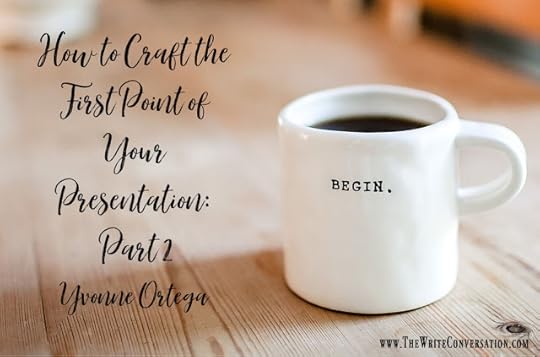
by Yvonne Ortega @YvonneOrtega1
In Part 2, you will go through the ways to use the foundational phrase in the first point of your presentation. We covered the niche and the foundational phrase in Part 1 of How to Craft the First Point of Your Presentation .
The First Way to Use the Foundational Phrase: Anecdote or Story
One of the most popular ways to craft your first point is the use of an anecdote or story.People delight in stories, especially personal stories about you, the speaker. Be human, humble and transparent. Share stories about your fears, failures, and flaws.
When you share your weaknesses, the audience can see that you’re like them. They can identify with you. If you only share your strengths, they might think you succeeded because you’re special. You’re perfect. Since they aren’t, they might give up without an effort to improve, much less succeed.
In my presentation on forgiveness, I tell the steak fondue story from the second chapter in my book, Moving from Broken to Beautiful® through Forgiveness. I tell the listeners that to take care of myself, I had to discover how to set boundaries.
Make a story file of your life. You can do a chronological one. Take your life in chunks of 5 or 10 years at a time and list memorable incidents you might use.
Your story file can list the funniest and the saddest events in your life. Regardless of the method you choose, you never know when you’ll need a story from that collection for one of the points in your presentation.
Save that file online and print a copy in case you need it. To err on the side of caution, I store documents in Word, Dropbox, and the cloud.
The Second Way to Use the Foundational Phrase: Activity
Besides an anecdote or story, you can start with an activity. A case study is an example of an activity. I give the audience enough information to come up with a solution for the case. Next, I have the audience break into small groups to complete the case study.
Another example of an activity is a role-play of an actual situation. The audience members who take part in it analyze the problem and act out the solution.
I don’t recommend that you use an activity the first time you speak to an unknown audience. You haven’t yet built rapport with the audience. They don’t trust you yet and may not respond.
I spoke at a women’s retreat where I knew everyone in the audience but two people. I introduced myself and chatted with them before my first of three keynotes.
In my second keynote, I used an activity. I had the audience break into small groups of 3 or 4 and gave them a case study to discuss, come up with a solution, and give their reason for it. Each group appointed a “reporter” for their discussion. Afterward, the “reporters” presented their group solution and reason to the entire audience.
The Third Step to Use the Foundational Phrase: Acronym
An acronym is a powerful tool to create curiosity and intrigue. It also makes your points easier to remember.
Debbie W. Wilson, Advanced Writers and Speakers Association (AWSA) professional member and Bible teacher, uses acronyms throughout her Bible study, Give Yourself a Break: Discover the Secrets to God’s Rest. One of her acronyms is REST:R RelationshipE Eternal MindsetS SurrenderT Trust
The Fourth Way to Use the Foundational Phrase: Analogy
“An analogy is a comparison between one thing and another, typically for the purpose of explanation or clarification” (lexico.com).
In my presentation on forgiveness, I talk about the ball and chain of unforgiveness and what they [the ball and chain] say to me, “Life is such a drag. You’ve taken me on the dustiest roads, and you’ve stirred up my allergies.”
When I speak about grief, I talk about “the river of regret.” As a river ebbs and flows, so does our regret. The time of year, holidays, anniversaries, birthdays, and the date of the person’s death can change the river of regret to high tide and flooding.
To wrap up, the four ways to craft your first point are:Anecdote/storyActivityAcronymAnalogy
Choose one of the four ways to support your first point and write it.
TWEETABLEHow to Craft the First Point of Your Presentation: Part 2 - @YvonneOrtega on @EdieMelson (Click to Tweet)
 Yvonne Ortega walks with a small footprint but leaves a giant imprint in people’s lives. This power-packed package is a professional speaker and the author of the Moving from Broken to Beautiful® Series through cancer, divorce, forgiveness, and loss. Learn more at www.YvonneOrtega.com
Yvonne Ortega walks with a small footprint but leaves a giant imprint in people’s lives. This power-packed package is a professional speaker and the author of the Moving from Broken to Beautiful® Series through cancer, divorce, forgiveness, and loss. Learn more at www.YvonneOrtega.comYvonne speaks with honesty and humor as she shares her life and struggles through presentations that empower women to find peace, power, and purpose through God’s Word.
Yvonne’s background as a licensed professional counselor brings a unique perspective into the heart of women. She’s a speaking and writing coach and the owner of Moving from Broken to Beautiful®, LLC. She belongs to the Advanced Writers and Speakers Association, the Christian Authors Network, the National Speakers Association, and Toastmasters International.
She celebrates life at the beach, where she walks, builds sand castles, blows bubbles, and dances.
Published on December 08, 2019 22:00
December 7, 2019
Expectations as a Writer's Stumbling Block
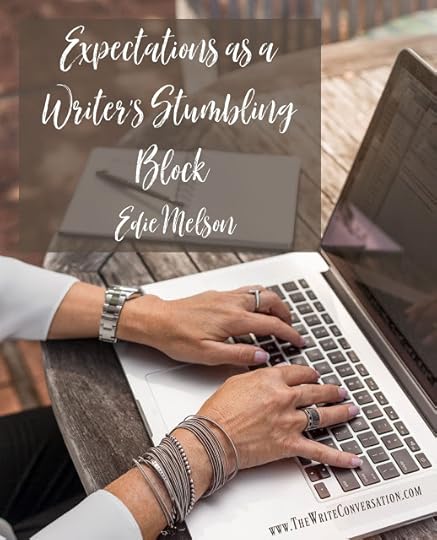
by Edie Melson @EdieMelson
My soul, wait in silence for God only, For my hope is from Him (Psalm 62:5)
When I was young all I wanted to be was a writer. As a matter of fact, I actually wrote my first novel in eighth grade...long hand, with a purple ink pen. But through the years, my dream of writing drifted farther and farther from the realm of reasonable possibilities, until I finally I gave up. But as a young mother of three kids, God revived that call. At first I was scared, but then I got excited. Oh the plans I made—I’d write Bible studies and spend my time traveling, speaking, and working for God.
I finished my first Bible study and the printer ink was barely dry before I had the manuscript in an envelope and on the way to publisher. I could see my future so clearly, and I was on fire with plans to do great feats in His kingdom. All He had to do was open this one door.
Not only did He not open that door, it seemed every other door had slammed shut and locked. It quickly became obvious that going and doing weren’t part of His call to me. Instead, the doors at home began to swing wide, as He invited me to share my story with those closest to me.
As I swallowed my pride and became obedient to act where He’d placed me, the fruit began to grow. Years later, going and doing has become part of my call, but first I’d had to learn obedience and the difference between His will and mine.
A Prayer When I Struggle with ExpectationsFor I am confident of this very thing, that He who began a good work in you will perfect it until the day of Christ Jesus (Philippians 1:6)
Dear Lord, I had such energy and hope when I first heard you whisper that I would be a writer. My imagination and dreams soared to the apex of what that calling could be. But now I’m no longer flying, instead I’m crawling through the mud of defeat and despair. Every word I write feels stale and like it’s all been said before. Am I faithfully following Your call or should I just give up
Help me let go of my own expectations and be a conduit for Your words. I want to share Your love through the words You have for me to write. Replace the false voices with the calling that allows me to be exactly who You made me to be
Speak to me. Let me clearly hear Your plan for my life. Lead me into fresh ways to write about You. Fill my sentences with words that touch the minds and hearts of those who read them. Let me see the world around me with fresh eyes as You speak Your truth in unusual ways. Then guide my hands as I re-cord what You’ve shown me.
Your world is a place of color and texture; sounds and smells. Renew my ability to paint pictures with words. Fill me with Your Spirit as my fingers once again fly across the keyboard. You are my inspiration and my joy. Open a pathway for that joy to spill over into my words as I write. Amen
TWEETABLEExpectations as a Writer's Stumbling Block—a devotion and prayer from @EdieMelson (Click to Tweet)
*This is an excerpt from Soul Care for Writers (Bold Vision Books 2019)
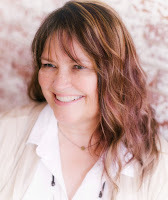 Edie Melson is a woman of faith with ink-stained fingers observing life through the lens of her camera. No matter whether she’s talking to writers, entrepreneurs, or readers, her first advice is always “Find your voice, live your story.” As an author, blogger, and speaker she’s encouraged and challenged audiences across the country and around the world. Her numerous books reflect her passion to help others develop the strength of their God-given gifts and apply them to their lives. Connect with her on her website, through Facebook, Twitter and Instagram.
Edie Melson is a woman of faith with ink-stained fingers observing life through the lens of her camera. No matter whether she’s talking to writers, entrepreneurs, or readers, her first advice is always “Find your voice, live your story.” As an author, blogger, and speaker she’s encouraged and challenged audiences across the country and around the world. Her numerous books reflect her passion to help others develop the strength of their God-given gifts and apply them to their lives. Connect with her on her website, through Facebook, Twitter and Instagram.
Published on December 07, 2019 22:00
December 6, 2019
Is a Bible Reading Plan for You in 2020?
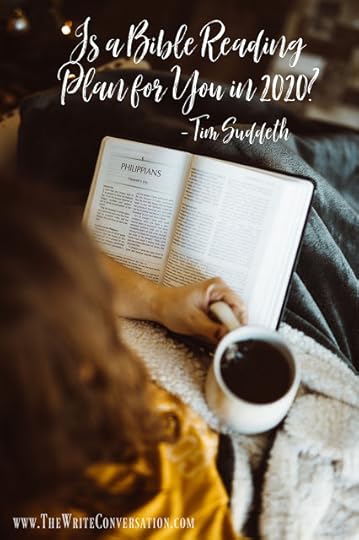
by Tim Suddeth @TimSuddeth
In my senior year at seminary, I had an epiphany. I was getting my Masters in Theology so that I could teach the Bible, yet I had never read it thru from cover to cover. I had grown up in church and gone to countless Bible studies so I knew most, if not all of the Bible. However, I’d never systematically read it in its entirety.Now, was that a whopping big deal? Probably not. God wasn’t going to meet me at His pearly gates and ask how much of His book I’d read.
Why had I never read the entire Bible?
Reason #1 It’s long. I mean Shakespeare long. (It is sixty-six books after all.)
At the beginning of each session in school, I always went through an experience common to all students, syllabus shock. That is when you look at all the requirements of the class and the size of the textbook and think there is no way you’ll be able to do it all. And every session, I learned that by having a system doing a little at a time, the syllabus got done.
Which is why making reading the Bible through in a year as a goal is a good idea. It breaks the big book into manageable sized chunks. My reading sessions generally ran from twenty to thirty minutes.
Reason #2 Some of the Bible seemed boring, archaic, or hard to understand.
I have to admit, I had tried to read the Bible through before. I made it to Leviticus before I got bogged down in all the laws and regulations and quit.
For my first successful attempt, I used the One Year Bible in NIV. It breaks the daily reading into passages from the Old Testament, the New Testament, and the Psalms. That helped me get through the hard parts and let me divide the reading into a morning portion and an evening.
After completing the Bible, I learned that some parts that I was afraid of were not that earth shattering. There are still parts I don’t understand, but I found more places with teaching that I could apply today.
Reason #3 What if I found something that went against what I believed?
I’d already read in the Bible how to style my hair (Ezekiel 44:20), how to wear my tassels (?) (Dt. 22:12), and what types of meat I’m supposed to eat (Lev. 11). What if there was something in the fine print that went against what I’d been taught?
First, I don’t worship a church or a denomination. I worship a real, knowable God. And He has given us His word, written and translated by men, so that we may know Him.
I love my church. But it’s because of God’s sharing His love through His people, not because they chose the biblical teachings they liked and hid the ones they didn’t.
Second, God does not want his children, me, us, to live in ignorance, in darkness. (Isn’t it great to be able to say you’re God’s child?)
He wants us to know Him totally, in all His love, wisdom, power, and holiness. There is nothing He has to hide behind a curtain (Wizard of Oz and Luke 23:45).
Some Extra Tips
My goal was to read the Bible through every other year. That gave me a year where I could do more intense Bible studies as I saw appropriate.
Find a translation you like. I liked reading in different translations. It threw off memorizing but it often gave a different perspective on the scenes and stories. The biggest surprise to me was how similar the different translations are.
I would suggest not using a study Bible the first time, but to read through for plot and characters. (Sounds familiar?) You can write any questions you have in a journal that you can refer back to. I also liked to summarize what I read in the journal.
Give yourself grace. If you miss a day or two, it’s okay. Just read a little additional when you have time. If it takes you fourteen or fifteen months, that’s okay. You still completed your goal.
***
Reading your Bible in its entirety will not bring you salvation or even necessarily make you a better person. It’s not an end in itself. You have to take what you learn to heart and act upon it to know God better.
Since I made my goal in 1994, I’ve read the Bible 13 times. I’m thinking about not doing it again this coming year. Instead, I’ve started in 2020.
I want you to consider whether this is the year you want to set a Bible reading plan. Some other options are to read just the New Testament or read the Bible in two years.
I am glad I chose to read the Bible through and set a goal. It does require planning. Sticking it out helped me find connections I wouldn’t have necessarily seen otherwise.
It also helped me know my Savior better. And that was my most important goal.
TWEETABLE
Is a Bible Reading Plan for You in 2020 - thoughts from @TimSuddeth on @EdieMelson (Click to Tweet)
 Tim Suddeth is a stay-at-home dad and butler for his wonderful, adult son with autism. He has written numerous blogs posts, short stories, and three novels waiting for publication. He is a frequent attendee at writers’ conferences, including the Blue Ridge Mountain Christian Writers Conference and a member of Word Weavers and ACFW. He lives near Greenville, SC where he shares a house with a bossy Shorky and three too-curious Persians. You can find him on Facebook, Twitter, or at timingreenville.com.
Tim Suddeth is a stay-at-home dad and butler for his wonderful, adult son with autism. He has written numerous blogs posts, short stories, and three novels waiting for publication. He is a frequent attendee at writers’ conferences, including the Blue Ridge Mountain Christian Writers Conference and a member of Word Weavers and ACFW. He lives near Greenville, SC where he shares a house with a bossy Shorky and three too-curious Persians. You can find him on Facebook, Twitter, or at timingreenville.com.
Published on December 06, 2019 22:00
December 5, 2019
Grow Your Blog by Avoiding These 9 Mistakes
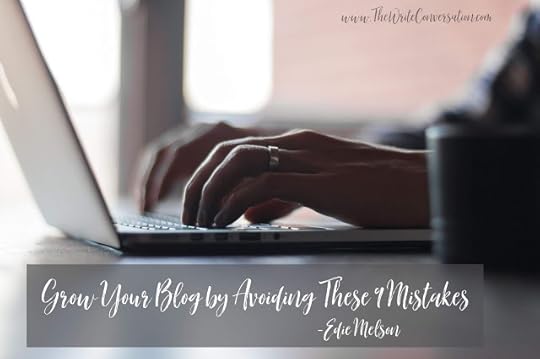
by Edie Melson @EdieMelson
Blogging is a great way to connect with our online audience. And while there are a lot more people out there doing it well, I still see some common mistakes. These things affect a blog, making readers click away before they finish a post and even unsubscribe altogether.
Today I’m going to share the top blogging mistakes I see from authors.
Blogging Mistakes1. Lack of Interaction. When someone takes the time and effort to comment on your blog post, it’s only polite to answer them. Sure there are days when we get busy and really can’t reply, but if you’re known for taking time to answer, those times will be forgiven. After all, look how patient you all are with me!2. Inconsistent Posting. I know I’ve said this at least one hundred times, but it bears repeating. If you expect readers to visit your blog consistently, they have the right to expect you to blog consistently.3. Weak Blog Post Titles. I know we’re not supposed to judge a book by its cover—or its title. But we all do it. Without compelling titles, blog posts go unread and readers unsubscribe.4. Little or No Formatting. Reading online takes more effort than reading actual ink on paper. Bloggers can overcome that with proper formatting. This includes using a sans-serif font, block formatting, bullet points, and bold subheadings. All these make the page easier to read.5. Too Many Grammatical Errors. I know, I really shouldn’t be the one throwing stones here. You all know I’ve allowed misspelled words, omitted words and grammatical errors into my posts. But I’m referring to numerous errors in almost every single post.6. Lack of Focus. Variation isn’t bad, but don’t go overboard. A blog without a focus is a blog without an audience.7. Posts that are too Long. People today are way more willing to spend time rather than money. Regularly posting things that are more than 500 - 600 words long will cost you readers.8. No Images with Blog Posts. Just like the formatting issue, images help break up the text and provide for easier reading. They also give visual clues to the content.9. No Click to Tweet. We all want our posts to be shared, but sometimes we're not good at providing a simple way for readers to do that. Take time to learn how to install Click to Tweet and you'll be glad you did!These are the main mistakes I see consistently. But I'd love to know what mistakes you've encountered. Be sure to leave your thoughts in the comments section below.
Don't forget to join the conversation!
Blessings,
Edie
TWEETABLE
Grow Your Blog by Avoiding These 9 Mistakes - @EdieMelson (Click to Tweet)
 Edie Melson is a woman of faith with ink-stained fingers observing life through the lens of her camera. No matter whether she’s talking to writers, entrepreneurs, or readers, her first advice is always “Find your voice, live your story.” As an author, blogger, and speaker she’s encouraged and challenged audiences across the country and around the world. Her numerous books reflect her passion to help others develop the strength of their God-given gifts and apply them to their lives. Connect with her on her website, through Facebook, Twitter and Instagram.
Edie Melson is a woman of faith with ink-stained fingers observing life through the lens of her camera. No matter whether she’s talking to writers, entrepreneurs, or readers, her first advice is always “Find your voice, live your story.” As an author, blogger, and speaker she’s encouraged and challenged audiences across the country and around the world. Her numerous books reflect her passion to help others develop the strength of their God-given gifts and apply them to their lives. Connect with her on her website, through Facebook, Twitter and Instagram.
Published on December 05, 2019 22:00
December 4, 2019
Choose Wisely
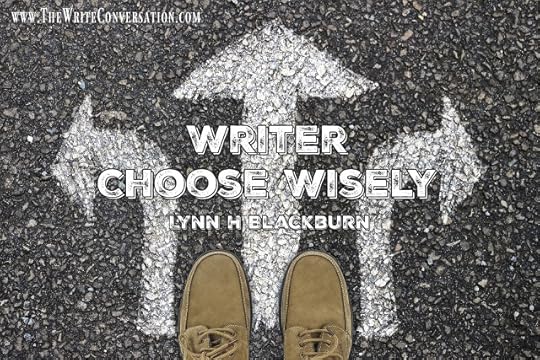
by Lynn H. Blackburn @LynnHBlackburn
I didn’t win NaNo. I could have won, but I didn’t, and I’m not sorry.
In case you have no idea what I’m talking about, NaNo is short for NaNoWriMo, which is short for National Novel Writing Month. The goal of NaNo is to write 50K in one month. I have no idea what a typical writing month looks like for writers who write full time, but for this writer, 50K is a lot. By a lot, we’re talking double what I would normally consider a very good month.
I got close. I could have done it.
But I chose not to, and I think the choosing is why I don’t feel bad about it. I had friends and family in my house all Thanksgiving weekend and it was awesome. We ate yummy food and kids played outside and we talked and laughed and cheered for our team. I spent most of Thanksgiving weekend prioritizing my real life over my fictional world, but before even one person was invited over, I seriously considered spending the entire weekend writing. In the end I chose to let the word count slide.
Please understand, this is not a criticism of anyone who came out of their writing cave long enough to fuel up with the kind of carbs marathoners need and then went back to a world that is only real inside their heads. Sometimes, that’s what is required—I’ve been there—and if that was you this Thanksgiving, I hope the words flowed like gravy poured over mashed potatoes!
This is to encourage those of you for whom the word count slipped a bit. And maybe it will continue to slip for the next few weeks as we
If you’re worried about how the holidays will impact your writing, let me make two suggestions:
1. Write every day. Even if it’s just for five minutes.
I’m not a fan of the “you have to write every day to be a real writer” philosophy, but when life is bonkers and you can barely keep up, taking that five, ten, fifteen minutes may not make much of a dent in your word count, but it does keep the story fresh in your mind and it keeps the story important in your list of priorities. That few minutes a day will pay off huge when you do sit down to write for a longer stretch, whether that’s next week or in January.
I wrote every single day in November. Even after I had a houseful of people, I didn’t stop writing, but I did stop stressing about the word count and the progress for a few days, and for me, for this year, it was the right choice. I took two days off, and got back at it in December. I’ll write every day in December, but I’ll also go to Christmas parties and plays, the ACC Championship, and I’ll even squeeze in a few Hallmark movies. :)
2. Prayerfully ask yourself why you’re so focused on writing during this season.
Is it a deadline? Then prayerfully
If you aren’t on a deadline, then look hard at your motives. Sometime we secretly enjoy our martyr status. There’s a sneaky vein of pride in that, y’all. Sometimes we use our writing to help us avoid less pleasant things or as a convenient excuse to help us get out of things we should do but don’t want to do. There’s a twisty river of dishonesty there.
But what if it’s really about fear? Fear that if you take any kind of break from the push toward publication, then it won’t happen. If it’s fear, and y’all, I’ve been there, then it’s time to release your grip on that story, that poem, that study, that essay, and remember that you serve a God who writes amazing stories and He’s writing yours. He can’t be thwarted by a disappointing December word count. You serve a much bigger God than that!
This season, choose trust. Trust that God, the same God who loved you so much He sent His Son to live and die for you, will give you the time to create. And whether He chooses to give you five minutes or five hours, whatever He gives will be enough.
TWEETABLEThoughts on a writer choosing wisely from @LynnHBlackburn on @EdieMelson (Click to Tweet)
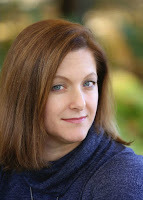 Lynn H. Blackburn loves writing suspense because her childhood fantasy was to become a spy—but her grown-up reality is that she's a huge chicken and would have been caught on her first mission. She prefers to live vicariously through her characters and loves putting them into all kinds of terrifying situations—while she's sitting at home safe and sound in her pajamas!
Lynn H. Blackburn loves writing suspense because her childhood fantasy was to become a spy—but her grown-up reality is that she's a huge chicken and would have been caught on her first mission. She prefers to live vicariously through her characters and loves putting them into all kinds of terrifying situations—while she's sitting at home safe and sound in her pajamas! Her Dive Team Investigations series kicked off in 2018 with Beneath the Surface and In Too Deep (A SIBA Okra pick and Selah Award Finalist). The 3rd book in the series, One Final Breath, releases in September 2019. She is also the author of Hidden Legacyand Covert Justice,which won the 2016 Carol Award for Short Novel and the 2016 Selah Award for Mystery and Suspense. Lynn lives in South Carolina with her true love and their three children. You can follow her real life happily ever after at www.LynnHBlackburn.com and on Facebook, Twitter, Pinterest, and Instagram.
Published on December 04, 2019 22:00
December 3, 2019
Start Writing Your Book in the Right Place

by Sarah Sally Hamer @SarahSallyHamer
What a silly question! It starts at the beginning, right? Or does it? Where exactly IS that beginning?
Believe it or not, most people (especially newbies), start in the wrong place. Do you?Where is the RIGHT place?It is not back story.It is where the action begins.It is at the most important place.It is all about character.
Easy enough. Right? We just pick a character and start writing. Okay. So it’s not that simple. Sorry!
Let’s start with back story.
Back story is everything that happens before the story begins. But if you don’t know WHERE the story begins, everything is in play. Narrow the focus. What is your story about? What’s the core event? In so many words, our characters aren’t born the day they step onto the first page. They have a “previous life” which can be decades before the story starts, some of which DOES belong in the story. Just not in the beginning. For instance, you don’t need to know a character broke his elbow when he was thirteen, like Jem Finch did, unless it has a direct bearing on the core event of the story – HOW he broke that elbow. (To Kill a Mockingbird starts with a description of Jem’s broken elbow. A lot of back story follows, which I don’t recommend, but Harper Lee does it beautifully.)
Action is imperative. Most readers aren’t interested in a long, drawn-out explanation of everything that happened to the character during their life. In fact, one of my friends says, “Don’t tell me about the labor pains, show me the baby!” He’s exactly right. Start with action, making sure you hook that reader, THEN tell them how the character got there. This is also the most important place to start – where something is happening, not mired in the past.
Character, and how the story relates to that character, gives the reader someone to “attach” to. Even the most lovely description, if it’s not seen through a character’s eyes, can be boring. Back story is the reason a character sees things in a special way – as do we humans. If something horrible has happened, it’s hard to have a happy outlook on life, and it skews our perception. The reader needs to see the end result of the skew, not the genesis of it. At least not at the beginning.
In my blog on Deep Point of View , I describe Belinda, a soon-to-be ex-wife. She’s in the courtroom hallway, waiting on the divorce trial to begin and sees her husband smooching with his new girlfriend.
Where would her story start? Do we need to see the years of marriage, as they grew farther and farther apart? Do we need to see their wedding or the birth of their children? Probably not. By starting a story in media res (in the middle of the action), we hook our audience with her blowing up at the ex in the hallway.
Is the back story important? Absolutely!! But where’s the best place to tell it to the audience? Probably not at the very beginning.
So, start with action, not a character thinking about something. SHOW us the character, so we know how they react under stress. Poor Belinda probably thinks she has everything under control until she sees her husband’s new squeeze, tight skirt and all. How would you feel in the same situation? We don’t need a lot of background at this point – we need to see Belinda react. Then, fill in with information (also known as motivation), as you need it. Maybe Belinda’s best friend meets her for lunch and Belinda tells an incident from the past that gives the reader information about why she blew up.
Bottom line, write the back story.
It’s good for you as the author to understand your characters’ motivations and back story is where it comes from. But don’t show it to the reader in the first fifty or so pages. Sprinkle it in, one tidbit at a time over a series of scenes, holding the best of it for the scene that makes the most impact on the reader.
Throw the character into action from the very first, even if it’s just Belinda controlling herself enough to smile and shake hands with the floozy. Make the reader wonder WHY. Why did the marriage break up? Why did the ex find another woman? Why is Belinda so upset? These are all questions you’ll need to answer.
Just not on the first page.
Where do you start your stories? Why?
TWEETABLE
Start Writing Your Book in the Right Place - tips from @SarahSallyHamer on @EdieMelson (Click to Tweet)
 Sarah (Sally) Hamer is a lover of books, a teacher of writers, and a believer in a good story. Most of all, she is eternally fascinated by people and how they 'tick'. She’s passionate about helping people tell their own stories, whether through fiction or through memoir. Writing in many genres - mystery, science fiction, fantasy, romance, medieval history, non-fiction – she has won awards at both local and national levels, including two Golden Heart finals.
Sarah (Sally) Hamer is a lover of books, a teacher of writers, and a believer in a good story. Most of all, she is eternally fascinated by people and how they 'tick'. She’s passionate about helping people tell their own stories, whether through fiction or through memoir. Writing in many genres - mystery, science fiction, fantasy, romance, medieval history, non-fiction – she has won awards at both local and national levels, including two Golden Heart finals.A teacher of memoir, beginning and advanced creative fiction writing, and screenwriting at Louisiana State University in Shreveport for over sixteen years, she also teaches online for Margie Lawson at www.margielawson.com. Sally is a free-lance editor and book coach at Touch Not the Cat Books, with many of her students and clients becoming successful, award-winning authors.
You can find her at hamerse@bellsouth.netor www.sallyhamer.blogspot.com
I wish to express gratitude to the giants whose shoulders I stand on and who taught me so much about the writing craft. I would list every one, if it were only possible.
Published on December 03, 2019 22:00
December 2, 2019
Don’t Throw Away Your Writing
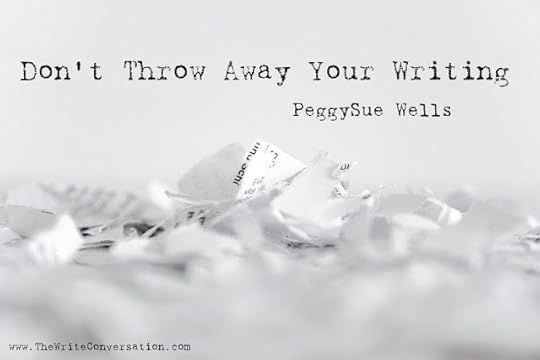
by PeggySue Wells @PeggySueWells
Peabody Award winner, Paul McCusker is a screenwriter (Beyond the Mask), scriptwriter, director of multiple award-winning audio dramatizations, Dove-nominated song writer, and author. If you’ve listened to Focus on the Family’s Adventures in Odyssey, now in its 30th year, you are familiar with a quarter of a century of Paul McCusker’s excellent and prolific writing. Looking back, the multi-published, multi-genre writer recalls career-impacting advice he received from his high school gym teacher. Here is the story.
I could probably point to all the various pieces of advice most would-be writers get. “Write what you know.” “Write what you don’t know.” “Read, read, read all the best writing you can.”
And so on.
But my mind goes back to a spring day when I was in Junior High School. I was dressed for gym class and we were all walking out to the athletic field for exercises and probably a game of soccer. I was walking with Mr. Morbeto, one of our instructors, who had taken a keen interest in my love of books and writing. I casually mentioned to him that I’d found a story I had written the year before, and that I was so disgusted by my work that I threw the story away.
He suddenly stopped in his tracks and turned to face me, pointing a finger at my chest. “Don’t you ever throw away your writing. I don’t care how bad you think it is now, you keep it. One day it may inspire you to do something better.” And he turned and walked on.
I took his advice—and have the files and filing cabinets to prove it. And he was right. Not only have old, discarded drafts inspired me to new ideas, but they’ve also inspired me as I’ve seen how far I’ve come—and how far I have to go. To this day, whenever I speak to an audience of young would-be writers, I tell them what a wise gym teacher once told me.
TWEETABLE
Don't Throw Away Your Writing! Best #Writing Advice EVER from @PeggySueWells on @EdieMelson (Click to Tweet)
 Tropical island votary and history buff, PeggySue Wells parasails, skydives, snorkels, scuba dives, and has taken (but not passed) pilot training. Writing from the 100-Acre wood in Indiana, Wells is the bestselling author of twenty-eight books including The Slave Across the Street, Slavery in the Land of the Free, Bonding With Your Child Through Boundaries, Homeless for the Holidays, and Chasing Sunrise. Optimistic dream-driver, PeggySue is named for the Buddy Holly song with the great drumbeat. At school author visits, she teaches students the secrets to writing, and speaks at events and conferences. Connect with her at www.PeggySueWells.com, on Facebook at PeggySue Wells, and Twitter @PeggySueWells.
Tropical island votary and history buff, PeggySue Wells parasails, skydives, snorkels, scuba dives, and has taken (but not passed) pilot training. Writing from the 100-Acre wood in Indiana, Wells is the bestselling author of twenty-eight books including The Slave Across the Street, Slavery in the Land of the Free, Bonding With Your Child Through Boundaries, Homeless for the Holidays, and Chasing Sunrise. Optimistic dream-driver, PeggySue is named for the Buddy Holly song with the great drumbeat. At school author visits, she teaches students the secrets to writing, and speaks at events and conferences. Connect with her at www.PeggySueWells.com, on Facebook at PeggySue Wells, and Twitter @PeggySueWells.
Published on December 02, 2019 22:00
December 1, 2019
Writing Holidays in Speculative Fiction
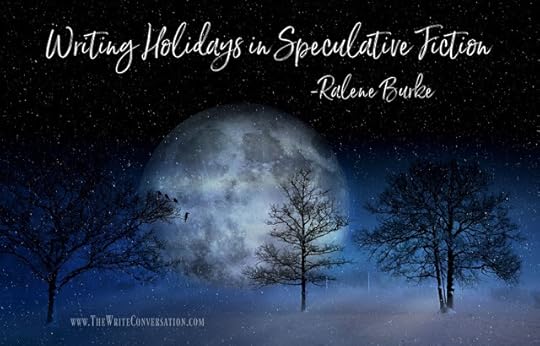
by Ralene Burke @RaleneB
We’re right smack dab in the middle of holiday season! Halloween and Thanksgiving are behind us, and Christmas and New Year’s are both less than a month away. Welcome to my favorite time of the year!
Many writers of fiction that takes place in our world don’t have to worry too much about holidays. They only need to be aware of what they are and where they fall in their story timeline. If a writer is writing a historical novel set in winter in 19th century England, but they don’t have the character’s celebrating Christmas in some way? Well, that’s a little weird. In speculative fiction, however, we don’t necessarily have those restraints because our worlds are either completely made up or alternate timelines. Either way, holidays should still be a part of our world building because holidays mark times of emotional and community importance that could affect the story.
However, just as with other aspects of world building, we would do a disservice to the readers and our story if we randomly made up holidays and placed them anywhere on the timeline.
Holidays usually fall into 4 categories:Seasonal (think Harvest, Solstice, etc.)Religious (to note major events like we do Christmas and Easter)Historical Events (think Thanksgiving, Independence Day, etc.)Important Dates (someone’s birthday, New Years, etc.)
My Sacred Armor Trilogy takes place in a completely made-up world, so I did not have our holidays to fall back on. So far, only one holiday has shown up in my story world. In Armor of Aletheia, the characters celebrate the New Year—a community feast to thank the Creator for the blessings of the last year and to ask for protection and such in the year to come.
While Sword of Soter does not show any holidays, Temple of Tzedek will highlight two. One is a beginning of the harvest season, the other will be a kingdom-specific holiday where they are forced to celebrate the day the evil warlock came to power. Fun, right?
Things to remember when creating holidays:Culture-specific: While many cultures may celebrate the same holiday, they often celebrate it in different ways. Just think about how many incarnations of Santa Claus there are.Rational: The holiday should center around something that makes sense to the people. Holidays are often a result of a strong emotion attached to a people group.Traditions: Similar to culture-specific, most holidays have specific traditions that are associated with it: like cake and presents for birthdays or fireworks on 4th of July. Range: Some holidays are world-wide; some are just for a community or family.
I love discovering what kinds of events my characters enjoy celebrating. And it’s different for each of them, just like it is for us. Some people love Christmas, some would rather sleep through it. Some people really get into Valentine’s Day and all it stands for, while others say the candy companies are capitalizing on consumerism.
Our characters should resemble the collective as well, remembering that holiday opinions are often a result of past experience, religious/familial beliefs, and current priorities.
Now I need to go write some Christmas cards so I can get them sent off this week. Yes, I’m one of those. I pray each of you is inspired and encouraged this holiday season and as we prepare for the new year. Blessings!
TWEETABLEWriting Holidays in Speculative Fiction - tips from @RaleneB on @EdieMelson (Click to Tweet)
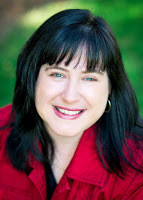 Whether she’s wielding a fantasy writer’s pen, a social media wand, or a freelance editor’s sword, Ralene Burke always has her head in some dreamer’s world. And her goal is to help everyone #SHINE Beyond their circumstances! Her novels, Bellanok and Armor of Aletheia, are available on Amazon. More fantasy novels coming soon!
Whether she’s wielding a fantasy writer’s pen, a social media wand, or a freelance editor’s sword, Ralene Burke always has her head in some dreamer’s world. And her goal is to help everyone #SHINE Beyond their circumstances! Her novels, Bellanok and Armor of Aletheia, are available on Amazon. More fantasy novels coming soon!When her head’s not in the publishing world, she is wife to a veteran and homeschooling mama to their three kids. Her Pinterest board would have you believe she is a master chef, excellent seamstress, and all-around crafty diva. If she only had the time . . . You can also find her on Facebook, Instagram, Twitter, or at her website.
Published on December 01, 2019 22:00



